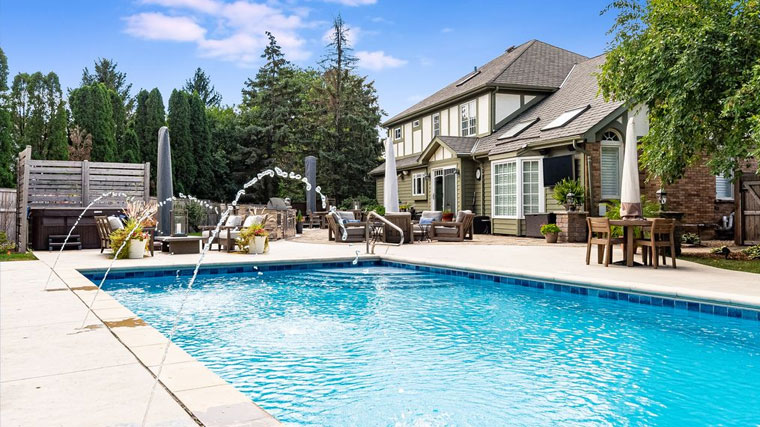
A swimming pool pump is essential for maintaining clean and clear water, ensuring that your pool remains a healthy and enjoyable place for relaxation. However, like all mechanical devices, pool pumps can break down over time. When this happens, homeowners often face the dilemma of whether to repair the existing pump or invest in a new one. Here’s a guide to help you make an informed decision.
Signs You Need to Address Your Pool Pump
Recognizing the signs of a failing pool pump early can help you decide whether to repair or replace it:
- Reduced Water Flow: A clogged impeller or failing pump can significantly reduce water flow through your filtration system, leading to cloudy pool water and poor chemical circulation.
- Unusual Noises: Grinding, squealing, or knocking sounds indicate potential mechanical issues within the pump.
- Leaking: Pool pump leaks waste water and often indicate failing seals or gaskets.
- Tripped Circuit Breaker: A pump that frequently trips the circuit breaker is a red flag for electrical problems within the motor.
- Visible Damage: Cracks in the pump housing or rust around the motor could signal the pump is nearing the end of its lifespan.
Repair vs. Replace: Factors to Consider
When to Repair Your Pool Pump
Repairing a pool pump can be a cost-effective solution, especially if the issue is minor or the pump is relatively new. Here are some scenarios where repair might be the best option:
- Minor Leaks: Often caused by worn-out seals or O-rings. Replacing seals and gaskets can resolve the issue.
- Noisy Operation: Debris caught in the impeller or worn bearings can cause noise problems. Cleaning the impeller or replacing bearings can fix these issues.
- Electrical Issues: Problems with wiring, capacitors, or switches can often be repaired by a professional.
- Recent Purchase: If your pump is still under warranty or only a few years old, repairing it is often more economical.

When to Replace Your Pool Pump
In some cases, replacing the pump is the better choice, particularly if the pump is old or the repair costs are high. Consider replacing your pump under these circumstances:
- Frequent Breakdowns: Multiple repairs within a short period indicate a failing pump. Investing in a new, reliable pump can save money in the long run.
- High Repair Costs: If repair costs approach 50% of the price of a new pump, replacement is a better financial decision.
- Outdated Technology: Newer pumps are more energy-efficient and offer better performance. Upgrading to a variable-speed pump can significantly reduce energy costs.
- Severe Damage: Cracked housings, severely corroded components, or burned-out motors typically warrant replacement.
Additional Considerations
- Cost of Repair vs. Replacement: Get estimates from a qualified pool technician for both repairs and pump replacement. Compare the cost of parts and labor for the repair against the price of a new pump and standard installation fees.
- Energy Efficiency: Newer pool pumps are often more energy-efficient, which can lead to significant long-term cost savings on utility bills.
- Warranty: If your pump is still under warranty, repairs may be covered, making them a more attractive option.
- Availability of Parts: If replacement parts for your pump model are becoming scarce, replacement may be the better long-term solution.
Conclusion
Deciding whether to fix or replace a broken pool pump depends on the specific issue, the age of the pump, and the costs involved. Minor problems and newer pumps often warrant repairs, while older pumps with significant issues may be better off replaced. For expert advice and service, contact Sunset Pools & Spas. Our team can help you evaluate your situation and recommend the best course of action to keep your pool running smoothly.